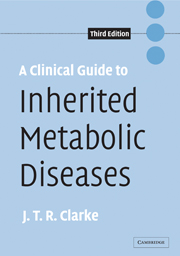Book contents
- Frontmatter
- Contents
- Reviews of first edition
- Reviews of second edition
- List of tables
- List of figures
- Preface
- 1 General principles
- 2 Neurologic syndrome
- 3 Metabolic acidosis
- 4 Hepatic syndrome
- 5 Cardiac syndromes
- 6 Storage syndrome and dysmorphism
- 7 Acute metabolic illness in the newborn
- 8 Newborn screening
- 9 Laboratory investigation
- 10 Treatment
- Index
- References
4 - Hepatic syndrome
Published online by Cambridge University Press: 10 September 2009
- Frontmatter
- Contents
- Reviews of first edition
- Reviews of second edition
- List of tables
- List of figures
- Preface
- 1 General principles
- 2 Neurologic syndrome
- 3 Metabolic acidosis
- 4 Hepatic syndrome
- 5 Cardiac syndromes
- 6 Storage syndrome and dysmorphism
- 7 Acute metabolic illness in the newborn
- 8 Newborn screening
- 9 Laboratory investigation
- 10 Treatment
- Index
- References
Summary
Liver involvement of some kind is a presenting feature of a number of inherited metabolic diseases. The metabolic activities of the liver span a vast catalogue of functions important to the metabolism of the entire body. It is surprising, therefore, that the repertoire of responses to injury is limited, and inborn errors of metabolism manifesting as hepatic syndrome are commonly difficult to distinguish from many acquired conditions, such as infections, intoxications, developmental abnormalities, and neoplasia. One approach to the diagnosis of inherited metabolic diseases presenting as hepatic syndrome is to consider four possible presentations, recognizing that there is considerable overlap between them. They are:
jaundice;
hepatomegaly;
hypoglycemia;
hepatocellular dysfunction.
Jaundice
Jaundice is caused by accumulation of unconjugated or conjugated bilirubin, which may occur as a result of increased production, impaired metabolism, or biliary obstruction. Bilirubin is a porphyrin pigment derived from the degradative metabolism of the heme of hemoglobin.
Unconjugated hyperbilirubinemia
Pure unconjugated hyperbilirubinemia is characteristic of disorders associated with increased bilirubin production. Mature erythrocytes have no mitochondria. They derive virtually all the energy needed to maintain ion gradients, intracellular nucleotide concentrations, membrane plasticity, the iron of hemoglobin in the reduced state, and other functions, from glycolysis and the hexose monophosphate shunt. Not surprisingly, specific hereditary deficiencies of any of the enzymes involved commonly present with hemolytic anemia. Some are also associated with neurologic symptoms, such as severe psychomotor retardation (e.g., triosephosphate isomerase deficiency) or myopathy (e.g., phosphofructokinase deficiency) (see Chapter 2).
- Type
- Chapter
- Information
- A Clinical Guide to Inherited Metabolic Diseases , pp. 116 - 142Publisher: Cambridge University PressPrint publication year: 2005



